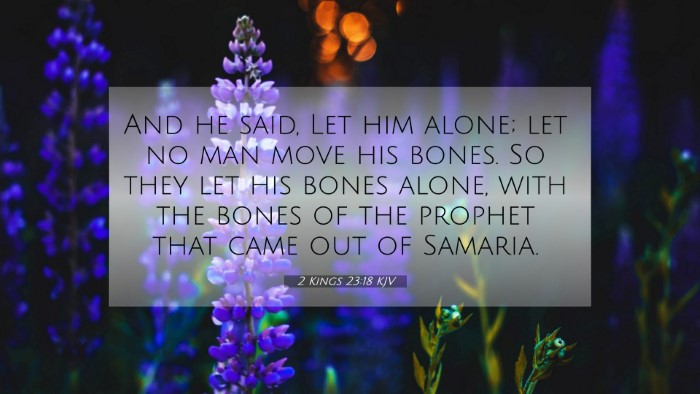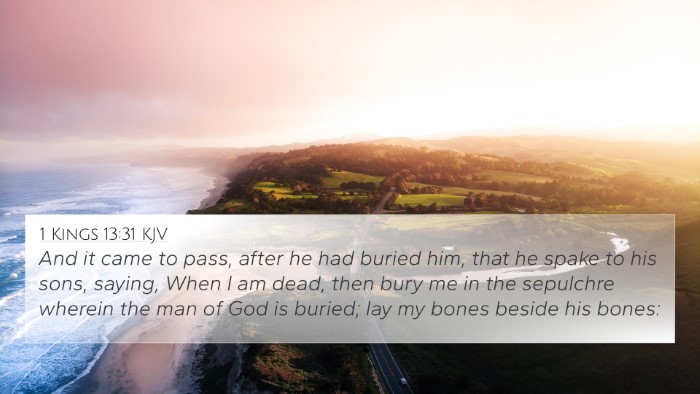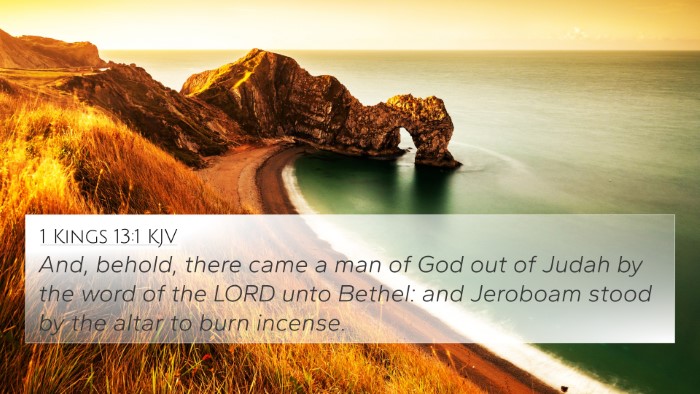Understanding 2 Kings 23:18
This verse captures a significant moment in the history of Judah during the reign of King Josiah, emphasizing the king's commitment to the covenant and the strength of his reforms.
Verse Overview
2 Kings 23:18 states:
"And he said, Let him alone; let no man move his bones. So they let his bones alone, with the bones of the prophet that came out of Samaria." (2 Kings 23:18, KJV)
Context of the Verse
This event occurs during King Josiah's reformative actions after discovering the Book of the Law. His efforts to cleanse the land of idolatry lead him to confront the graves of false prophets.
Commentary Insights
-
Matthew Henry:
Henry reflects on the memorial of the prophet and how Josiah honors him by allowing his burial place to remain untouched. He emphasizes that the actions of Josiah demonstrate a respect for true prophecy amidst widespread apostasy.
-
Albert Barnes:
Barnes elaborates on the significance of leaving the bones undisturbed. The king's attitude towards preserving the memory of a true prophet highlights the importance of acknowledging God's messengers even when others have strayed from the faith.
-
Adam Clarke:
Clarke notes that Josiah's command reflects his desire to honor God's justice and righteousness. Preserving the prophet’s bones serves as a reminder of God's faithful individuals amidst idolatry and falsehood.
Bible Cross-References
Several verses intertwine with 2 Kings 23:18, showcasing themes of prophecy, reform, and divine justice:
- 1 Kings 13:31: The story of the prophet from Judah—showing how his prophecy was honored despite the circumstances of his death.
- Psalms 34:20: Reference to God preserving the bones of the righteous—a thematic parallel regarding protection.
- Jeremiah 26:23: The attempt to silence prophets reflects the tension between divine message and human authority.
- Matthew 23:29-31: Jesus’ rebuke of the religious leaders for honoring the graves of the prophets while rejecting their messages ties back to the idea of honoring true prophets.
- Lamentations 4:4: Reflects on the horrors of judgment, focusing on the plight of God's ministers in a time of crisis.
- 2 Chronicles 34:33: Another account of Josiah’s reform actions providing more context to his actions in 2 Kings 23.
- Ezekiel 14:13-14: The preservation of the faithful amidst judgment highlights the honoring of God’s true prophets.
Thematic Connections
This verse serves as a foundation for understanding how monarchy, prophecy, and divine worship interconnect within the broader narrative of Israel's kings. By analyzing the actions of Josiah, we see relevant themes, including:
- Faithfulness to God's Word: Josiah's reverence for a true prophet emphasizes the importance of adhering to God's commands.
- Judgment and Restoration: The act of preserving the prophet's bones symbolizes God's judgment on Israel’s leaders while illuminating Josiah’s restoration efforts.
- Respect for Prophetic Truth: Despite Israel’s pervasive idolatry, acknowledging the true prophet signifies hope for the nation’s future.
Practical Applications
The message of 2 Kings 23:18 remains relevant today in several ways:
- Honoring God's Messengers: We should show respect to those who faithfully convey God's word.
- Commitment to Divine Command: The story urges believers to remain steadfast in following God’s teachings amidst societal challenges.
- Encouraging Righteous Reform: Josiah's reforms inspire modern believers to advocate for spiritual renewal in their communities.
Concluding Thoughts
2 Kings 23:18 encapsulates a profound lesson about reverence for God's prophets and the importance of adhering to His commands. Through cross-references and thematic connections, we uncover layers of meaning that enrich our understanding of God’s ongoing narrative with His people.
FAQs About 2 Kings 23:18
What does 2 Kings 23:18 teach about honoring prophets?
The verse illustrates the importance of respecting God's servants, even after their passing, as a testament to their faithful service.
How can we use this verse for Bible study?
This verse can be a focal point for discussions on the role of prophecy, Israel’s history, and spiritual reforms during times of apostasy.
What are some tools for Bible cross-referencing?
Utilizing a Bible concordance, cross-reference guide, and Bible chain references can aid in exploring connections within scripture.




